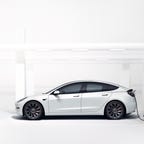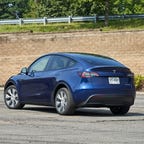Hyundai’s new Ioniq 6 ties with the Lucid Air Pure as the most energy efficient electric car on the road.
When shopping for or discussing electric cars, it’s easy to get hung up on range as the most important metric, but how far an EV can get you is only part of the picture. Much like the miles per gallon we’re already familiar with from gasoline cars, electric vehicle efficiency (measured in miles per kilowatt-hour) plays a huge role in how much it costs to drive an electric car, but also affects everything from vehicle design, sticker price and performance.
I’ve rounded up the five most energy-efficient electric vehicles on sale today, as estimated by the US EPA. Also highlighted are the most efficient electric pickups, which come with different performance and range requirements than the sedans and SUVs that make up the bulk of the list. And I’ve answered some frequently asked questions about EV efficiency and kilowatt-hours.
Most efficient electric cars and SUVs
Hyundai’s Ioniq 6 is the newest model on this list, hitting dealerships earlier this year, but it also ties for the most efficient electric car you can buy today. The 6’s aerodynamic sedan body rides atop the Hyundai Motor Group’s E-GMP electric vehicle platform — which also underpins SUVs like the Ioniq 5, Kia’s EV6 and EV9 and the Genesis GV60 — giving it the edge in range and efficiency over its extended EV family. In its thriftiest Long Range RWD configuration, the Ioniq 6 cruises up to 361 miles and covers 4.17 miles per kilowatt-hour. That’s an EPA-estimated equivalent of 140 mpge.
In a tie for first place is the luxurious and long-ranging Lucid Air electric sedan, bolstered by the new Pure and Touring trim levels introduced earlier this year. Slightly lighter than the range-topping Grand Touring model thanks to their smaller battery pack and more modest interior trim, the 425-mile Touring and 410-mile Pure cruise for 4.17 miles per kWh, reaching an EPA-estimated 140 mpge.
Tesla has entered the chat with the long-range, dual-motor version of its affordable electric sedan, the Model 3. This configuration is the most energy efficient spec in the American EV manufacturer’s lineup cruising for 4 miles per kWh and averaging about 132 EPA-estimated mpge over its 358-mile range. Like its more spacious sibling the Model Y, it also qualifies for up to $7,500 EV tax credit under the Federal Inflation Reduction Act, giving your operating cost savings a kickstart.
The Model Y is the more spacious and heavier twin of the aforementioned Tesla Model 3. The increased mass and taller aerodynamic profile has the slightest impact on energy efficiency. The EPA reckons the electric SUV will glide along at 3.85 miles per kWh, which works out to around a 123 mpg equivalent.
One of the most affordable electric cars at dealerships today, the Hyundai Kona Electric is a surprisingly efficient budget electric car. Stretching up to 258 miles per charge from its 64-kWh battery pack, the Kona EV covers up to 3.7 miles per kWh, returning the energy equivalent of 120 mpg. Its low entry and operating costs make it a thrifty choice for commuters, but we wouldn’t recommend frequent road trips due to its Achilles’ heel — relatively slow DC fast charging speeds.
Most efficient electric pickup trucks
The taller ride height, upright windshield and utility-boosting, but aero-unfriendly open bed of the pickup truck doesn’t cut through the air as cleanly as a sedan, crossover or SUV. Plus, delivering the power and torque that truck buyers expect for light towing or off-grid crawling requires larger, heavier power reserves. And so, electric trucks tend to be less energy-efficient than smaller EVs, sitting at the bottom of the EPA’s current EV efficiency listings.
That said, electric pickup trucks are generally significantly more energy efficient than their diesel or petrol-powered predecessors with the two most popular models returning the equivalent of over 70 mpg.
Rivian’s electric adventure truck, the R1T, rolls out with a quad-motor configuration that allows it to precisely control torque application to each individual wheel. I was able to experience this configuration on the highways and trails of Colorado. All in all, you’re looking at a combination of more than 800 hp and 900 lb-ft of torque. Even more impressive is its 328-mile range, made possible by its huge 135-kilowatt-hour Large Pack battery pack.
Soon, Rivian will offer lighter, more efficient specs, but currently the EPA-estimated best configuration rolls on 21-inch wheels for up to 2.17 miles per kWh and averages 73 mpge.
Ford’s F-150 Lightning tackles the electric pickup truck formula from a more traditional direction. Offered as a barebone Lightning Pro work truck up to the surprisingly luxurious Platinum trim, the most impressive thing about the Lightning is how much it looks and feels like a regular F-150 pickup. This is a huge compliment, considering Ford’s F-Series has been one of (and often the) best selling vehicles in America for decades.
However, the Lightning stands above the rest of the F-Series at the pump — more accurately, the charging station — averaging 2.08 miles per kWh over its 320-mile range or about 70 mpge. Plus, thanks to a recent price cut, the electric F-150 is even more affordable.
Why is EV efficiency important?
The range estimate of an electric car only tells part of the story. Let’s take two EVs with similar range — the 247-mile Chevrolet Bolt EUV and the 248-mile Genesis GV60. If you were to only look at range, you might assume that these two different vehicles are similarly efficient. However, the Chevy uses a 65-kWh battery while the Genesis needs 77.4 kWh to get the same job done. That’s because at 3.45 miles per kWh versus 2.86 (or 115 mpge versus 95), the Bolt is roughly 20% more energy efficient. Meanwhile, the most efficient Hyundai Ioniq 6 stretches the same 77.4 kWh pack as the Genesis all the way to 361 miles of range.
A more efficient EV can return improved range, require a smaller battery pack or both. And because the battery is usually the heaviest part of an electric car, that sets off a cascade of advantages. A lighter EV exhibits less tire and brake wear, improved driving dynamics and less wear and tear on roads and driveways. A lighter car requires less energy to accelerate, which is a bit of an efficiency double-dip.
A more efficient EV uses less energy per trip and, since electricity usually isn’t free, that saves you money.
The battery is the most expensive component on an electric car, so more efficient EVs with sensibly sized batteries are often also among the most affordable options. And the savings don’t stop at the dealership. Electricity usually isn’t free; you’ll pay for it by the kilowatt-hour when charging at home or at public fast charging stations. So using less energy per mile driven saves money in the long run.
Finally, there are advantages to charging time. A less efficient 300-mile EV with a big ol’ battery takes longer to charge than a more efficient 300-mile EV with a smaller pack, assuming they accept power at a similar rate. (Which they don’t always, but that’s a different discussion.) It’s just like how the 25-gallon tank on a pickup takes longer to fill than a 15-gallon sedan, but on a much longer scale.
What does mpge mean?
Miles per gallon equivalent or mpge is a unit of measurement developed in 2010 by the US Environmental Protection Agency to help shoppers compare the efficiency of alternative fuel vehicles (such as hybrids, plug-in hybrids and battery electric) directly with gasoline-powered vehicles. The unit is based on a calculation that one gallon of gasoline contains the energy equivalent of about 33.7 kilowatt-hours of electricity, but can also be adapted to compare hydrogen fuel cell vehicles and even compressed natural gas cars.
Today, savvy shoppers are more familiar with kilowatt-hours — the unit of energy that home electricity use is measured and priced by — but the EPA’s combined mpge estimate persists as a handy tool for drivers considering converting from traditional to electrified vehicles. Using mpge as a shorthand, for example, a driver can more or less directly compare a Kia Niro Electric (113 mpge) to the Kia Niro Hybrid (53 mpge) and know the EV is a little more than twice as fuel efficient, despite using different types of fuel delivered in totally different ways.
How is EV efficiency measured?
Outside of the world of combustion comparison, miles per kilowatt hour is, in my opinion, the easiest unit of efficiency to understand. Think of the battery as your gas tank and the kilowatts of energy as gallons of fuel and it’s a direct substitute for mpg, serving the same purpose as mpge. It also fits the familiar paradigm of “number gets bigger as efficiency goes up,” making it a more natural tool for comparing EVs against one another or the effects of your driving habits on the efficiency in real time. This is why many EVs choose to display efficiency on their trip computers and dashboard displays in miles per kWh.
Electric car efficiency can be measured in miles per kilowatt-hour or kilowatt-hours per 100 miles. Both units are useful for different reasons.
In addition to mpge, the EPA breaks out efficiency in terms of kilowatt-hours per 100 miles, which is sort of the inverse of mi/kWh. Because electricity is most often charged by the kilowatt-hour, the kWh/100 mi is a handy unit to determine how much an EV will cost to operate. The math is simpler: A BMW i4 eDrive35’s 30 kWh/100 miles multiplies cleanly with Electrify America’s $0.36/kW fast charging rate, for example. That works out to around $11 for every 100 miles driven or, shifting the decimal point, $0.11 per mile.
Measuring miles per kilowatt-hour isn’t as simple as taking the range and dividing that by battery capacity for a variety of reasons. For starters, most EVs have a portion of their battery’s physical capacity reserved to prolong the longevity of the pack, reducing the effective or usable capacity of the battery by a small amount. Aerodynamics, rolling resistance and friction, weather and power used by other vehicle accessory systems also have an effect on how an EV behaves on the EPA test cycle versus real-world conditions. As the adage goes, your mileage may vary.
To help get the best possible mileage, check out our guides to maximizing the range of your electric vehicle, maintaining your electric car for optimal efficiency and calculating an EV’s total cost of ownership.



